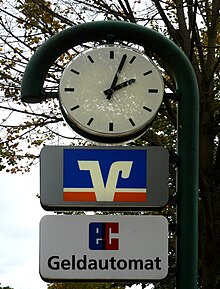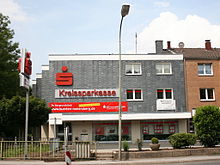Banking in Germany
Banking in Germany is a highly leveraged industry, as its average leverage ratio (assets divided by net worth) as of 11 October 2008 is 52 to 1 (while, in comparison, that of France is 28 to 1 and that of the United Kingdom is 24 to 1); its short-term liabilities are equal to 60% of the German GDP or 167% of its national debt.[1] From the 15th century, banking families such as Fugger, Welser and Hochstetter were international mercantile bankers and venture capitalists.However, customers mostly have to use their bank's ATM with their debit card if they do not want to pay a fee.Online payments are done mostly either with direct debit (Lastschrift) or with a credit card.Most banks offer a free main account (Girokonto) as long as the customer deposits a minimum amount regularly (over €1000 in income each month).

BankenviertelFrankfurt Stock ExchangeleverageFranceUnited KingdomGermanFuggerWelserHochstetterBerenberg BankBerenberg familyoldest or second oldest bankBVR co-operative bankselectronic cashbranchKürtenuniversal bankingprivate banksdirect banksDeutsche BankPostbankUnicredit Bank AG (HypoVereinsbank)CommerzbankDresdner BankCash Groupcooperative banksGerman Cooperative Financial Grouppublic bankssavings banksSparkassenLandesbankenSparkassen-Finanzgruppedebit cardcredit cardMasterCardDiners ClubAmerican ExpressMaestroOnline paymentsdirect debitGirokontoEconomy of GermanyList of banks in GermanyGermanyarticlesHistory of GermanyTimelineHistoriographyMilitary historyGermanic peoplesMigration PeriodList of early Germanic peoplesTeutonsVisigothsHistory of the HunsChronology of warfare between the Romans and Germanic peoplesCimbrian WarRoman campaigns in Germania (12 BC – AD 16)Marcomannic WarsGothic WarsSack of Rome (410)Frankish EmpireTreaty of VerdunEast FranciaCarolingian EmpireCarolingian dynastyHoly Roman EmpireOstsiedlung (East Colonisation)Early modern period, 1500–180018th-centuryConfederation of the RhineGerman revolutions of 1848–1849German ConfederationFrankfurt ConstitutionNorth German ConfederationUnification of GermanyGerman EmpireWorld War IWar guilt questionRevolution of 1918Weimar RepublicNazi GermanyAllied occupationFlight and expulsionsDenazificationDivided GermanyEast GermanyWest GermanyReunificationHistory of Germany since 1990History of PrussiaHistory of BrandenburgCologne WarBaden RevolutionGeographyAdministrative divisionsStatesDistrictsCities and townsEarthquakesGeologyIslandsPoliticsBundestagBundesratBundeswehr (military)ChancellorConstitutionCourt systemElectionsFederal GovernmentForeign relationsHuman rightsIntersexTransgenderLaw enforcementLobbyingConservatismNationalismPolitical partiesPresidentEconomyAgricultureAutomobile industryCentral bankChemical Triangle
